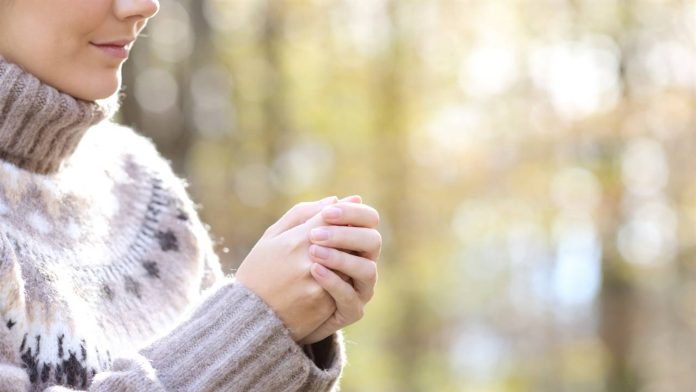The cold causes the skin to dry out. To avoid this, it is advisable to take some measures and choose products with entirely natural ingredients.

- Tips for taking care of your hands when it’s cold
- Why use a hand cream if it’s cold
- The best hand cream for the cold
- How to take care of the skin of the rest of the body when it is cold
- What creams to use for the body when it’s cold
- How to cleanse the skin in cold weather
The dry and cold air of winter, especially when suffering a cold wave, makes the skin of the hands dry. The hydrolipidic mantle of the skin is altered and can even fracture, which leads to the appearance of cracks.
The sebaceous glands, by decreasing the secretion of their hydrolipidic mantle, nourish the epidermis less. These factors favor the skin to become dehydrated, lose shine, elasticity and become more sensitive.
Some steps should be taken to take care of your hands and prevent these problems. By taking care of it properly, damage can be reduced and kept healthy and radiant.
TIPS FOR TAKING CARE OF YOUR HANDS WHEN IT’S COLD
The hands suffer especially the aggressions of the cold to be more unprotected. Their blood perfusion is lower, since they are far from the heart and often wet.
It is advisable to use gloves and greasy creams, which moisturize and protect them. Repair creams that have a larger oily portion are recommended, especially when the skin is more damaged. It is convenient to apply them regularly and always after each wash and at the end of the day.
For the usual care of the hands, you can take into account the following recommendations:
- Hot water promotes the elimination of oil from the skin. It is better to wash with cold or warm water.
- Use soapy water or a vegetable glycerin-based pill.
- If you wash dishes with your hands, wear gloves.
- The best time to apply the cream is immediately after washing, when the top layer of skin is still damp, because it can better absorb the ingredients. Put on some cream or pure almond oil after each wash.
- From time to time, put a thick layer of cream on your hands, especially around your nails, and put cotton gloves on overnight. In the morning you will have incredibly soft hands.
- Once a week, perform a gentle exfoliation with a natural product and then dip your fingertips in olive oil for 20 or 30 minutes.
WHY USE A HAND CREAM IF IT’S COLD
Hand creams have a higher proportion of oily ingredients than other skin products. They should favor the recovery of the fatty mantle that has deteriorated, but without leaving a greasy sensation in the hands. Appropriate ingredients are coconut, jojoba or sweet almond oils, or shea butter.
They can also contain oats, which softens and deflates the dermis, lanolin, which prevents moisture loss, and essential oils with calorific value such as rosemary and thyme.
THE BEST HAND CREAM FOR THE COLD
Hand creams are a star product in any drugstore, but conventional ones are loaded with petroleum-derived components and some of them are declared enemies of skin and health.
For example, some creams contain the fragrance “lilial” (or butylphenyl methylpropional), a molecule that has been classified as toxic for reproduction and that, by decision of the European health authorities, cannot be sold in products sold from March 1.
Formaldehyde, an allergenic and irritating compound that can be released from the preservative diazolidinyl urea, can also be found. Paradoxically, it is not uncommon to find it in creams that are presented as hypoallergenic.
There’s more: conventional products often contain parabens, which are hormone disruptors; polyethylene glycols (PEGs), which can make the skin more permeable to foreign matter; They may contain halogenated organic compounds such as chlorphenamine, which is also allergenic, or they may be contaminated with aromatic hydrocarbons, which may be carcinogenic (these may be found in products containing ingredients such as “paraffinum liquidum” or “mineral oil”).
For all these reasons, the best choice is a hand cream with a natural or ecological certification, as it will be free of these products and other petroleum derivatives.
HOW TO TAKE CARE OF THE SKIN OF THE REST OF THE BODY WHEN IT IS COLD
As for the body, it is advisable to apply a vegetable body oil after showering, to create a protective film that cares for the skin, keeps it hydrated and shelters it. Through the massage that is performed to extend it, blood circulation and venous return are improved.
WHAT CREAMS TO USE FOR THE BODY WHEN IT’S COLD
The skin is one of the most sensitive areas to inclement weather. To take care of it and protect it, denser creams should be used, unctuous and with a greater fat portion with shea or avocado; or natural waxes such as carnauba, candelilla or quince, which act as a protective barrier and reinforce the hydrolypic mantle.
You can add essential oils such as rosemary or thyme, high calorific value and should always be applied before exposure to cold.
You can use night creams in the morning, as they are more nutritious and usually have a higher lipid ratio.
And in the thinnest and driest skins, you can resort to moisturizing and nourishing masks.
In winter it is especially important to give up paraffins and petroleum jelly that give a false sensation of hydration and softness, but often have a rebound effect, which causes the skin to dry out more after application.
In all cases, the cream has to be restored at noon to provide more protection and nutrients to the skin.
HOW TO CLEANSE THE SKIN IN COLD WEATHER
Special attention should also be paid to cleaning the skin, using milks, which are more protective than soaps and lotions.
The lips, with their thin skin, do not have sebaceous glands that nourish them. That is why it is advisable to take care of them with vegetable butters (cocoa or shea), protectors (beeswax), or different plant extracts, such as those of calendula or chamomile.
Finally, sun protection should not be neglected either. It is advisable to use, as in summer, products with ecological mineral filters, although with lower factors.

